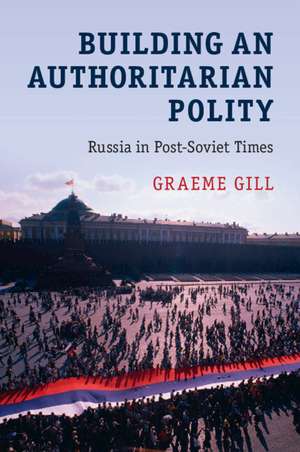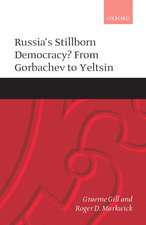Building an Authoritarian Polity: Russia in Post-Soviet Times
Autor Graeme Gillen Limba Engleză Paperback – 11 noi 2015
Preț: 202.14 lei
Nou
Puncte Express: 303
Preț estimativ în valută:
38.68€ • 40.50$ • 32.08£
38.68€ • 40.50$ • 32.08£
Carte tipărită la comandă
Livrare economică 09-23 aprilie
Preluare comenzi: 021 569.72.76
Specificații
ISBN-13: 9781107562424
ISBN-10: 1107562422
Pagini: 238
Ilustrații: 13 tables
Dimensiuni: 152 x 229 x 13 mm
Greutate: 0.33 kg
Editura: Cambridge University Press
Colecția Cambridge University Press
Locul publicării:New York, United States
ISBN-10: 1107562422
Pagini: 238
Ilustrații: 13 tables
Dimensiuni: 152 x 229 x 13 mm
Greutate: 0.33 kg
Editura: Cambridge University Press
Colecția Cambridge University Press
Locul publicării:New York, United States
Cuprins
1. Stability and authoritarian regimes; Part I. Structuring Public Political Activity: 2. Regime and society; 3. The party system and electoral politics; Part II. Structuring the Regime: 4. Structuring institutional power; 5. Elite stabilization; Conclusion: the Putin system and the potential for regime change.
Recenzii
'Theoretically informed and based on the author's intimate knowledge of post-Soviet politics, Graeme Gill's Building an Authoritarian Polity is bound to shape debates over the nature of the regime that is emerging under Putin as well as broader discussions in comparative politics.' M. Steven Fish, University of California, Berkeley
'In this path-breaking study of Russia's post-communist transition, which provides a tour de force of the theoretical literature on problems of democratization and the factors that enhance the stability of authoritarian regimes, Graeme Gill rightly brings the role of political elites and the state back to centre stage. In five beautifully crafted chapters, which cover all the key areas of the scholarly debate, Gill clearly demonstrates that it was the state building activities of Yeltsin and Putin that have been the single most important factor in explaining the construction and maintenance of Russia's authoritarian polity.' Cameron Ross, University of Dundee
'A bold reconceptualization of contemporary Russia as a fully authoritarian polity. And more than this, a detailed and compelling demonstration of the various ways in which it is sustained. It is hard to think of a better guide to the contemporary Russian system: students will welcome the clarity of its exposition, and scholars will welcome an account that engages convincingly with current debates in comparative politics without neglecting 'Russia as such'. A fine achievement.' Stephen White, University of Glasgow
'Graeme Gill has done it again. He tackles a complex set of contemporary Russian political, institutional, and elite issues and illuminated them with thoughtfulness and aplomb. Carefully overviewing more than two decades of complex domestic political developments, Gill offers the reader a comprehensive and compelling analysis: an analysis that is both nuanced and accessible, and one that represents a definitive study of the construction of a post-Soviet Russian authoritarian polity. A milestone study that merits serious attention and reflection.' John P. Willerton, University of Arizona
'Gill presents a persuasive case that authoritarianism in Russia is a product of the ways in which the regime structures political activity and the methods by which it has structured itself … Highly recommended.' J. W. Peterson, Choice
'Gill diagnoses a key Russian problem as the tension between two largely incompatible operating principles: the bureaucratic and the personalist.' Survival: Global Politics and Strategy
'In his knowledgeable, theoretically informed study of authoritarian resilience in Russia, Graeme Gill does an excellent job in identifying the factors that have led to the stabilization of nondemocratic rule under Putin.' Thomas Sherlock, The Russian Review
'Graeme Gill has written a concise, readable, yet remarkably detailed account of the construction of contemporary Russia's particular brand of authoritarianism, the linchpin of which is its charismatic and powerful president. Gill explains contemporary Russia not as the result of failed democratization, but as the result of elite-driven state-building in the absence of an ideological template with which to coordinate competing interests and centers of power in Russia's massive federal system.' Josephine T. Andrews, Slavic Review
'In this path-breaking study of Russia's post-communist transition, which provides a tour de force of the theoretical literature on problems of democratization and the factors that enhance the stability of authoritarian regimes, Graeme Gill rightly brings the role of political elites and the state back to centre stage. In five beautifully crafted chapters, which cover all the key areas of the scholarly debate, Gill clearly demonstrates that it was the state building activities of Yeltsin and Putin that have been the single most important factor in explaining the construction and maintenance of Russia's authoritarian polity.' Cameron Ross, University of Dundee
'A bold reconceptualization of contemporary Russia as a fully authoritarian polity. And more than this, a detailed and compelling demonstration of the various ways in which it is sustained. It is hard to think of a better guide to the contemporary Russian system: students will welcome the clarity of its exposition, and scholars will welcome an account that engages convincingly with current debates in comparative politics without neglecting 'Russia as such'. A fine achievement.' Stephen White, University of Glasgow
'Graeme Gill has done it again. He tackles a complex set of contemporary Russian political, institutional, and elite issues and illuminated them with thoughtfulness and aplomb. Carefully overviewing more than two decades of complex domestic political developments, Gill offers the reader a comprehensive and compelling analysis: an analysis that is both nuanced and accessible, and one that represents a definitive study of the construction of a post-Soviet Russian authoritarian polity. A milestone study that merits serious attention and reflection.' John P. Willerton, University of Arizona
'Gill presents a persuasive case that authoritarianism in Russia is a product of the ways in which the regime structures political activity and the methods by which it has structured itself … Highly recommended.' J. W. Peterson, Choice
'Gill diagnoses a key Russian problem as the tension between two largely incompatible operating principles: the bureaucratic and the personalist.' Survival: Global Politics and Strategy
'In his knowledgeable, theoretically informed study of authoritarian resilience in Russia, Graeme Gill does an excellent job in identifying the factors that have led to the stabilization of nondemocratic rule under Putin.' Thomas Sherlock, The Russian Review
'Graeme Gill has written a concise, readable, yet remarkably detailed account of the construction of contemporary Russia's particular brand of authoritarianism, the linchpin of which is its charismatic and powerful president. Gill explains contemporary Russia not as the result of failed democratization, but as the result of elite-driven state-building in the absence of an ideological template with which to coordinate competing interests and centers of power in Russia's massive federal system.' Josephine T. Andrews, Slavic Review
Notă biografică
Descriere
Argues that post-Soviet Russia was never on a democratic trajectory because dominant elites always fostered the building of an authoritarian polity.


















